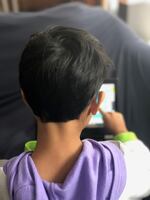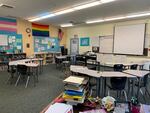Nadia Hasan has three children – two go to Barnes Elementary in Beaverton. She said her 8-year-old son used to love school, but now he gets overwhelmed with his online assignments.
“Instead of trying any of it, he just refuses to do any of it,” she said.
Hasan has watched him lash out and get angry. She hadn’t seen that before.
“He won’t communicate what he’s feeling,” Hasan said. “And what will happen is that he will throw things … one day he flipped the bookshelf and his mattress over.”
Feeling frustrated, Hasan wrote a blog post about her family's experience with distance learning and a reassuring phone conversation with her son's teacher.

Nadia Hasan's son works on his school-supplied Chromebook.
Courtesy of Nadia Hasan
“I cannot catch my breath because I am processing my own grief and cannot even begin to imagine his,” she wrote.
Hasan is a former teacher, and she said when her son gets upset, she’s been able to calm him down and better empathize with him. But that hasn’t made it any easier.
“There's a trauma associated with what he's going through by having lost school the way that he lost school and to lose it so suddenly,” Hasan said.
For her son, she said school was a place of connection, a sanctuary.
Now that’s gone.
“It's the friends, It's the playing, it's the teachers, it's the activities, it's the safe place you can go,” said Tina Meier-Nowell. She coordinates school psychologists and autism specialists across 20 school districts for the Northwest Regional Education Service District.
“When anything is disrupting of that for our kids, it's going to show somehow. And when our routines change, that can be really hard too,” Meier-Nowell said
“And kids don't have a lot of power in their lives. And now more than ever, I think they're feeling powerless.”
Students everywhere are going through a lot. Coronavirus has shut down their schools and many have parents or relatives who have lost jobs or gotten sick. Things changed almost overnight – leaving some feeling more stressed and uncertain than ever.
Stuck at home making ‘everything … so much worse’
For South Salem High School senior Eric Martz, one of the only things that's remained the same since COVID-19 is his weekly shift at YouthLine, a teen crisis helpline.
Every Wednesday he makes the hour-long trip from Salem to Portland to talk to teens and sometimes, just listen.
“There’s so many people – their mental health struggles like depression and anxiety, everything is so much worse right now when you can’t escape it,” Martz said. “There’s no distraction like school, and a lot of times, people’s support systems are at school, or at least just a distraction from their own mental state.”
Related: Without Face-To-Face Contact, Oregon Schools Struggle To Keep Students On Track
YouthLine reports more calls related to abuse, isolation, and anxiety. The number of “contacts” – calls, texts, chat messages, and emails – has increased, but the increased calls are consistent with the growth of the program.
At the same time, child abuse reports have dropped significantly since schools closed. That's raised significant concerns for Oregon's Department of Human Services. The agency typically counts on "mandatory reporters" in school to keep an eye on children.
Martz said he’s talked to students who feel stuck at home — and stuck with a family that might not support them.
“Usually we can find a therapist in their area, or we can tell them to talk to their school counselor … or talk to someone outside of their family,” Martz said.
At South Salem, students can sign up for online counseling appointments. But resources vary from school to school, and district to district.
When it comes to thinking about the end of his senior year, Martz said it’s bittersweet for students.
Related: Postcards From The Pandemic: Senior Year Cut Short
“It was kind of at first a lot of mixed feelings, and now it’s turned into a lot of sadness,” said Martz.
Earlier this year, Martz started Live To Tell, a nonprofit dedicated to suicide prevention. He’s proud of the progress he’s made – the group is growing, with affiliated clubs popping up at other schools around Salem. But there were other things he wanted to do this year.
As Martz graduates and leaves the organization, he said the pandemic has helped the group focus on the important things.
“We’re trying to remember why we’re doing this – we’re trying to support our peers,” Martz said.
For some students, connecting to school can be tough, especially at a time like this.
Supporting students you’ve never seen
Portland teacher Justin Ryland can’t see his students right now. And since COVID-19 closed schools in March, he has new students he’s never met before.

Justin Ryland's classroom sits empty on Wednesday, May 20, 2020, amid the ongoing coronavirus pandemic.
Courtesy of Justin Ryland
Ryland teaches students receiving mental health treatment in a residential program. They could be dealing with anxiety or depression. Some of them are in foster care, or just out of a hospital.
They may only stay for a couple of weeks at a time.
Related: With School Buildings Closed, Children's Mental Health Is Suffering
He said not being able to see and connect with those new students is one of the hardest parts about distance learning.
“Relationships with kids is key to me,” Ryland said. “The only way for me to really do that is to see their faces – and right now I can’t see their faces.”
Even though coronavirus is everywhere, Ryland tries not to talk about it.
“A lot of these kids don’t want to talk about it because it feels so overwhelming and they don’t quite understand because they haven’t been out in this world yet,” Ryland said.
He’s started lessons to help students develop skills to manage their emotions. And to get to know his new students, he shares a bit about himself and his past struggles with anxiety.
“By me being open and vulnerable at first will show them that it’s okay to share your emotions in a larger setting,” Ryland said. “And even though I can’t see them, they can see that I am someone who cares about them.”
State officials have said care and connection should take precedence over lessons in this time.
New problems, missing connections
Damon Lorenz works with Northwest Regional ESD’s Tina Meier-Nowell. He’s a school psychologist in the Tigard-Tualatin School District. As distance learning has progressed, he’s been able to talk regularly with some of the students he worked with before COVID-19. One of his students is dealing with new, COVID-19-related stress at home.
“Some of the things that we’re talking about now were a lot different than what we were talking about when we were in the school building,” Lorenz said. “It’s really just trying to meet him where he’s at right now and letting him know he’s not alone.”
Meier-Nowell and Lorenz worry about students they haven’t reached yet. Meier-Nowell thinks of the students who receive supports at school that may be hard to replicate at home.
And with the loss of school, Lorenz said both students and staff miss the routines and people they used to see every day.
“They’re just missing all those connections that they normally get in their lives and of course, their teachers that they spend a lot of time within the classroom,” Lorenz said. “I think all of that added together creates a lot more that everyone’s doing their best to handle – but it’s a lot at times.”
As a working parent with other children, Beaverton’s Hasan said she worries she can’t give her son enough time. She said trying to balance it all can be difficult.
Meier-Nowell said the key for educators and parents is to accept that everyone is doing the best they can and ask for help when they need it.
“We’re just looking to partner and find out how we can work together for the best for your kids, and to just be that loving and safe space for your kid right now is the very best thing you can do,” Meier-Nowell said.
Out of this stressful situation, Meier Nowell sees a few positives. Some students are doing better away from the distractions and social anxieties at school. And she’s seen districts working together to create supportive social environments for students, like a new communication group for students with autism.
Beaverton parent Nadia Hasan would love to have more group opportunities for her son.
“We want our kids to feel connected to something – which is the school,” Hasan said. “Whatever that feels like, and looks like.”
She’s tried video playdates, with mixed success.
So she asked her son’s teacher for help – and now they’ve started a Pokemon trading club.
If you or someone you know is in need of help, please go to www.oregonyouthline.org or text “teen2teen” to 839863.
Washington County Mental Health Services
Oregon Department of Education Mental Health Resources